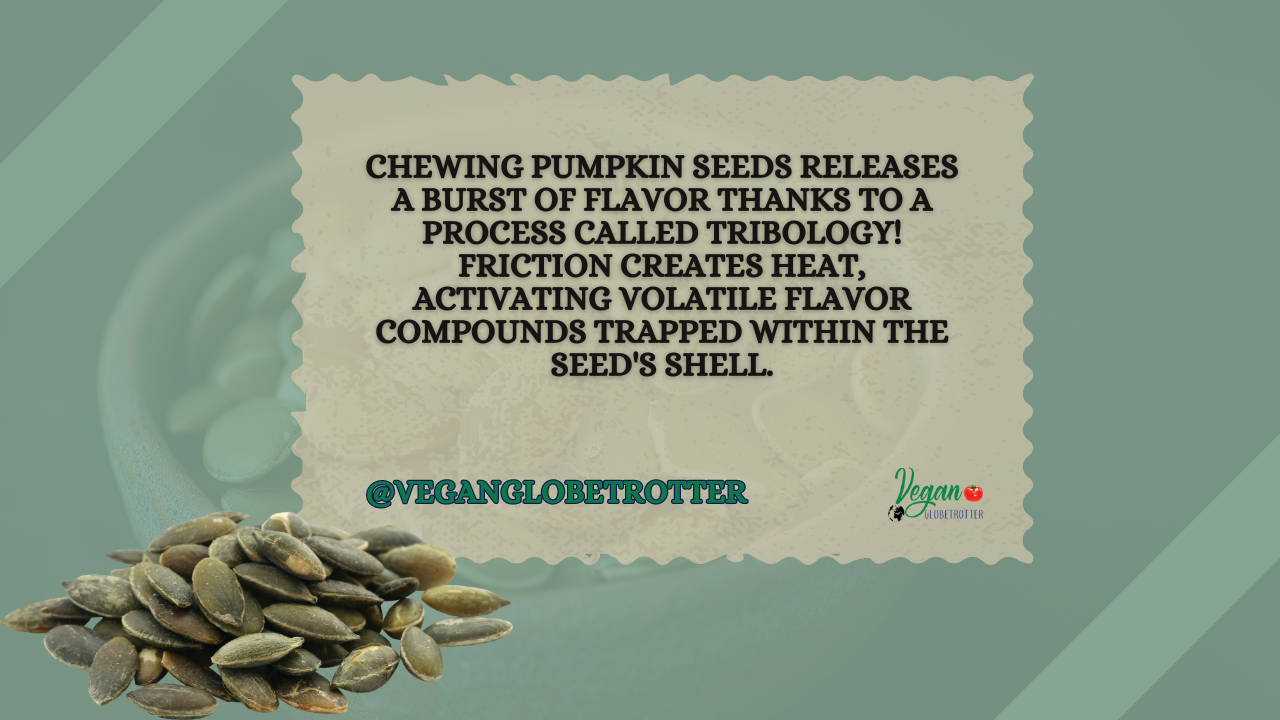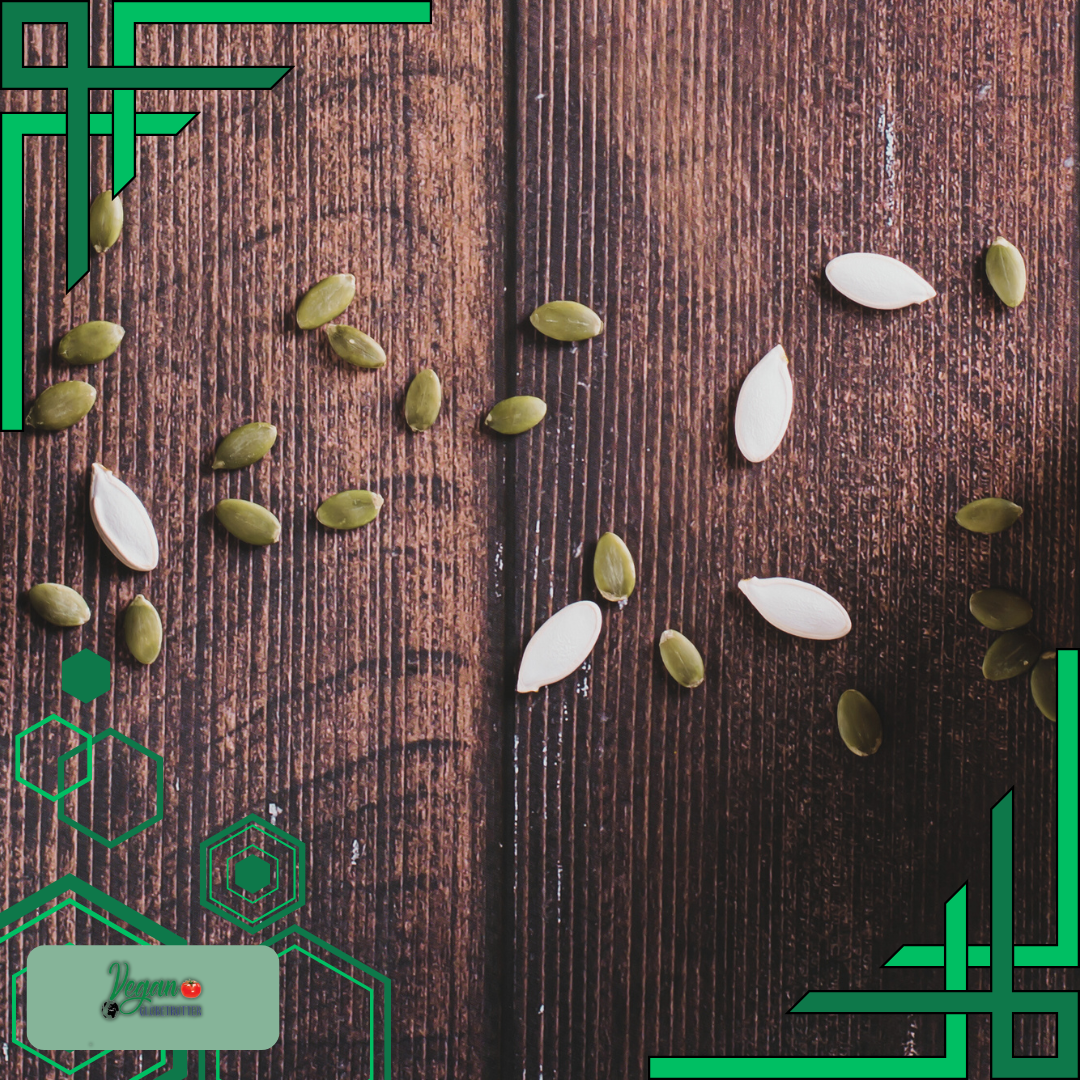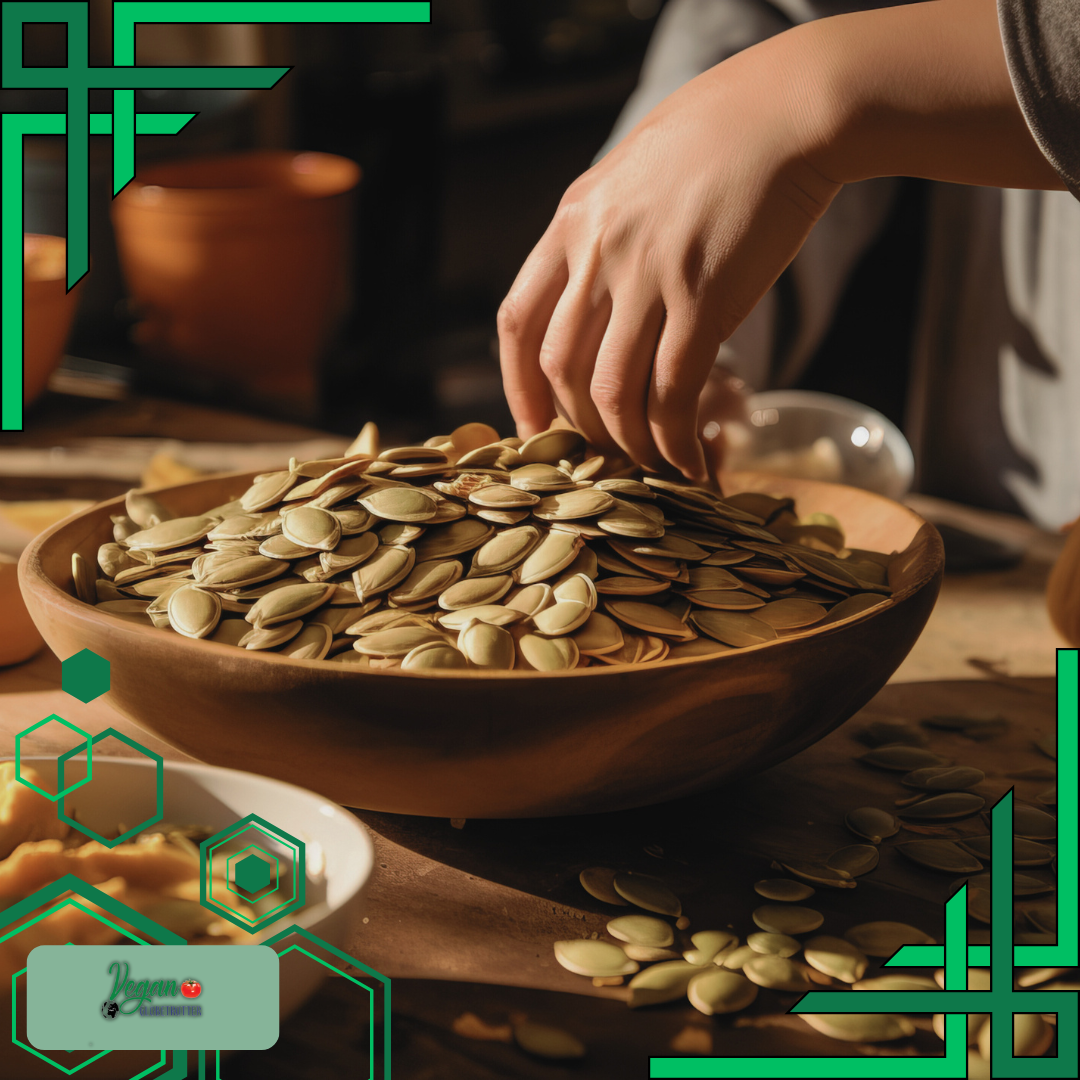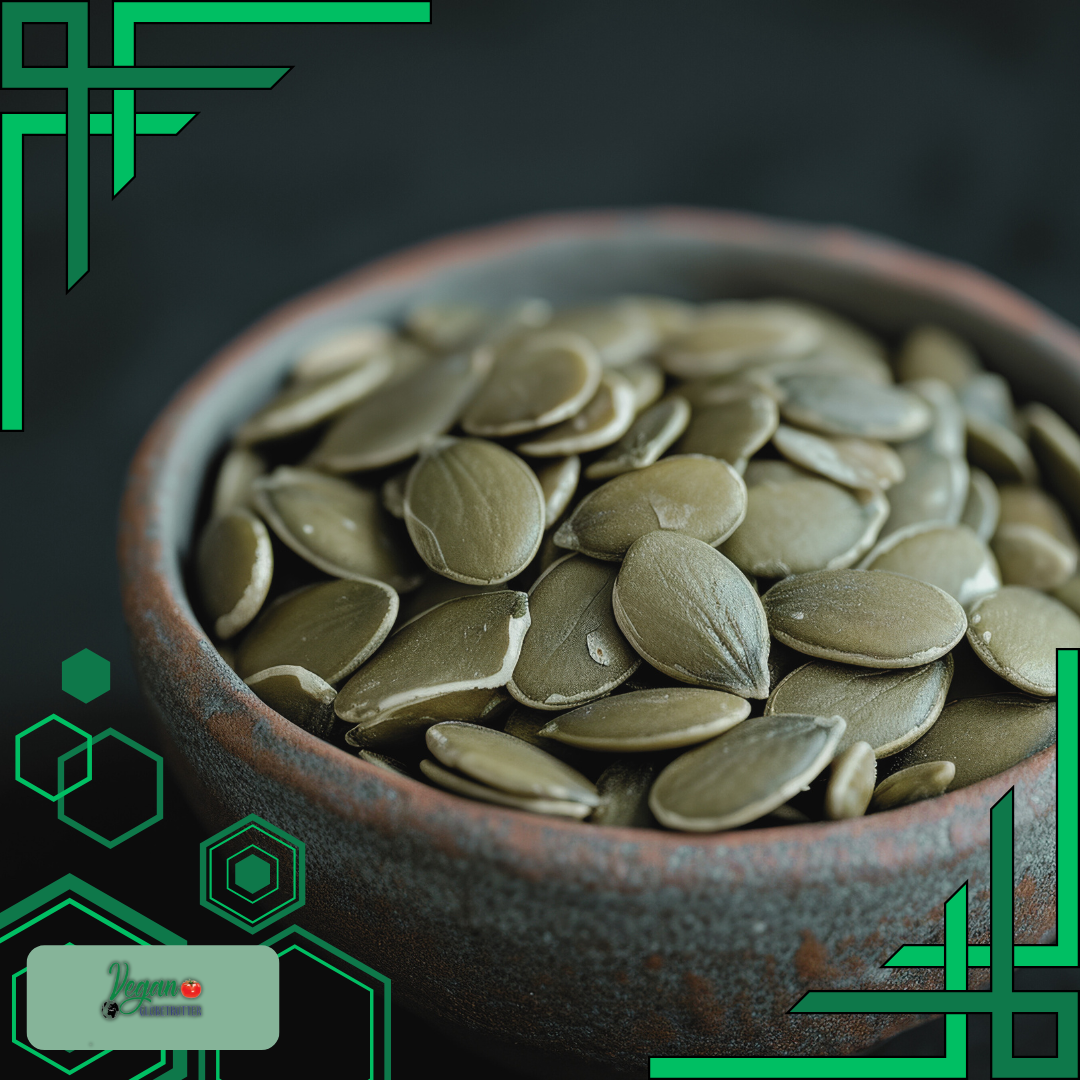Vegan Globetrotter is supported by our audience. When you purchase through one of our links, we may earn a small affiliate commission. As an Amazon Associate I earn from qualifying purchases. Your cost is not affected.
==================
How to Eat Pumpkin Seeds: When we prepare pumpkins at home, we often overlook the seeds, considering them either unnecessary or not part of our recipes. However, these small seeds nestled inside our favorite pumpkin are surprisingly valuable.
Pumpkin seeds are among the healthiest seeds, offering numerous health benefits. Whether snacking on them or using them in cooking, these nutritious seeds add a delightful crunch and nutty flavor that complements both sweet and savory dishes. In this guide, we will tackle how to enjoy these golden seeds, whether raw, roasted, or incorporated into various recipes. If you are excited, then keep reading!
How to Eat Pumpkin Seeds and How Much Each Day: A Simple Guide
Eating pumpkin seeds is an easy and tasty way to boost your nutrition. They are packed with valuable nutrients, including protein, fiber, and healthy fats. A small handful, around 30 grams or a quarter cup, is the recommended daily amount. This ensures you get a good mix of the benefits without overindulging.

Incorporating pumpkin seeds into your diet is a simple and delicious way to enhance your nutrition. They are rich in essential nutrients like protein, fiber, and healthy fats.
I enjoy integrating pumpkin seeds into my meals because of their versatility. Whether sprinkled on salads, mixed into yoghurt or enjoyed straight from the bag, they provide a satisfying crunch and a nutty flavor. Cooking with pumpkin seeds is also straightforward; roast them with your favorite spices for a flavorful snack.
However, it’s important to maintain balance with pumpkin seeds. Overconsumption can lead to excessive calorie intake. Proper storage in an airtight container in a cool, dark place is essential to preserve their freshness and nutritional value over time.
Key Takeaways
- The recommended daily intake of pumpkin seeds is around 30 grams.
- Pumpkin seeds are versatile and easy to add to various dishes.
- Store them properly to keep them fresh and nutritious.

The Basics of Pumpkin Seeds
Pumpkin seeds are widely loved for their rich nutritional profile and versatility. They offer numerous health benefits and are an excellent snack option for those looking to enrich their diet.

What Are Pumpkin Seeds?
Pumpkin seeds, also called pepitas, are harvested from inside pumpkins and are available in both hulled and unhulled varieties. Hulled seeds are green, while unhulled seeds have a white outer shell.
Beyond their decorative use, pumpkin seeds are rich in nutrients and versatile in culinary applications. They can be enjoyed raw, roasted, or incorporated into various dishes.
Personally, I enjoy sprinkling pumpkin seeds on salads, mixing them into yoghurt for added crunch and nutrition, or simply grabbing a handful as a quick and nutritious snack. Their versatility and nutritional benefits make them a valuable addition to any diet.

Nutritional Value of Pumpkin Seeds
Pumpkin seeds are a powerhouse of nutrients. A single ounce (about 28 grams) contains:
- Protein: 8.4 grams
- Carbohydrates: 5.2 grams
- Fiber: High in fiber content
- Healthy fats: Including omega-3 and omega-6 fatty acids
- Minerals: Magnesium, zinc, iron, and copper
- Vitamins: B vitamins and antioxidants
These nutrients contribute to heart health, lower cholesterol, and improve digestion. Eating pumpkin seeds regularly can also boost your immune system and provide a good energy source. Including pumpkin seeds in your daily diet is a simple way to enhance your overall nutrition.
Health Benefits of Eating Pumpkin Seeds
Pumpkin seeds are small but pack a punch when it comes to health benefits. They are beneficial for heart health, weight management, blood sugar control, and sleep quality.
Heart Health
Consuming pumpkin seeds is beneficial for heart health due to their rich magnesium content. Magnesium is crucial for maintaining normal blood pressure and supporting heart muscle function by relaxing blood vessels.
Additionally, pumpkin seeds contain omega-3 and omega-6 fatty acids, which help reduce inflammation and promote cardiovascular health. Incorporating pumpkin seeds into your diet can lower LDL (bad) cholesterol levels while increasing HDL (good) cholesterol levels.
Furthermore, the antioxidants present in pumpkin seeds help prevent cholesterol buildup in arteries, promoting optimal heart and blood vessel function and reducing the risk of heart disease. Regular consumption of pumpkin seeds supports overall cardiovascular wellness.
Weight Management
Pumpkin seeds can significantly contribute to a successful weight management strategy due to their high protein and fiber content.
Each ounce of pumpkin seeds provides approximately 8.4 grams of protein and 5.2 grams of carbohydrates, predominantly dietary fiber. Snacking on a handful of pumpkin seeds can effectively curb appetite and prevent overeating. Additionally, they are rich in essential fatty acids that support the body’s fat-burning processes.
Incorporating pumpkin seeds into your diet regularly can lead to more effective weight management than consuming high-calorie, low-nutrient snacks. This makes them a valuable addition to any balanced eating plan to achieve and maintain a healthy weight.
Blood Sugar Control
Pumpkin seeds are beneficial for managing blood sugar levels, making them a suitable snack option for individuals with diabetes or insulin resistance due to their low glycemic index. The magnesium content in pumpkin seeds plays a crucial role in regulating blood sugar by enhancing insulin sensitivity.
Incorporating pumpkin seeds into your diet can promote better blood sugar control. They help slow down the absorption of sugar into the bloodstream, preventing sudden spikes and dips in blood sugar levels.
Choosing pumpkin seeds as part of your daily snacks can support stable energy levels throughout the day, making them a wise choice for maintaining overall health.
Sleep Quality Improvement
Pumpkin seeds are beneficial for improving sleep quality due to their natural content of tryptophan, an amino acid known to promote sleepiness. Consuming pumpkin seeds aids in producing serotonin, a hormone crucial for regulating mood and sleep patterns.
Additionally, pumpkin seeds are rich in magnesium and zinc, essential minerals that significantly regulate sleep. Incorporating pumpkin seeds into your evening snack routine can improve your overall sleep quality, helping you both fall asleep more quickly and stay asleep throughout the night.
Preparation and Consumption Techniques
Eating pumpkin seeds can be both enjoyable and nutritious. Here’s how to prepare them through roasting, sprouting, and adding them to various meals and snacks.

Roasting Pumpkin Seeds
Roasting pumpkin seeds enhance their natural flavor and gives them a satisfying crunch. Start by cleaning the seeds thoroughly, removing any pulp, and rinsing them under cold water. Pat them dry with a towel.
Preheat your oven to 375°F (190°C) and spread the seeds evenly on a baking sheet in a single layer. Drizzle them with olive oil and season with salt or your preferred spices, such as paprika or garlic powder. Roast the seeds for about 20 minutes, stirring occasionally to ensure even cooking, until they turn golden brown.
I often roast a large batch of pumpkin seeds to enjoy throughout the week. They make a perfect snack on their own and add a delightful crunch to salads and soups.
Sprouting Pumpkin Seeds
Sprouting pumpkin seeds is a great way to enhance their nutrient content and enjoy them in various ways. Start by soaking the seeds in a bowl of water for 8-12 hours, then drain and rinse them thoroughly.
Transfer the rinsed seeds to a jar with a sprouting lid or cover the jar with cheesecloth secured by a rubber band. Store the jar upside down at an angle to allow for drainage and air circulation.
Rinse the seeds twice daily until tiny sprouts appear, usually within 1-3 days. Sprouted pumpkin seeds can be enjoyed raw or dehydrated for a crunchy texture. I love adding them to smoothies or yoghurt to boost their nutritional value.
Adding to Meals and Snacks
Pumpkin seeds are a versatile addition to many dishes, enhancing texture and nutrition in sweet and savory foods. Sprinkle them on salads, cereals, or oatmeal for an added crunch. Blend them into smoothies or incorporate them into baked goods like muffins and granola bars.
Their mild, nutty flavor pairs well with a variety of recipes. Additionally, try adding pumpkin seeds to soups or sauces for a unique flavor and a nutritional boost.

Recommended Daily Intake
Eating pumpkin seeds can offer many health benefits. It’s important to know how much to eat daily and how to adjust intake based on dietary restrictions.
General Guidelines for Adults
For most adults, the American Heart Association suggests consuming a quarter cup of pumpkin seeds daily, which is about 30 grams. This amount provides a good dose of protein, healthy fats, fiber, zinc, and magnesium.
In one ounce (28 grams) of raw pumpkin seeds, you’ll find:
- Carbohydrates: 5.2 grams
- Protein: 8.4 grams
- Magnesium: 150 milligrams
Including various other foods will help ensure you get a balanced supply of nutrients.
Adjusting for Dietary Restrictions
If you have specific dietary needs, you might need to adjust your intake of pumpkin seeds accordingly.
For instance, if you have a magnesium deficiency, consuming two to three ounces of hulled pumpkin seeds daily can be beneficial, as they provide up to 250 milligrams of magnesium per ounce.
Vegetarians and vegans can rely on pumpkin seeds as a valuable plant-based source of iron. To enhance iron absorption, pair pumpkin seeds with foods rich in vitamin C. If you’re monitoring your calorie intake, it’s helpful to know that an ounce of pumpkin seeds contains approximately 150 calories.
Before making significant changes to your diet based on health conditions or nutrient requirements, always consult with a nutritionist or healthcare provider.
Shopping and Storage Tips

When buying pumpkin seeds, picking the freshest and best quality is important. Proper storage is essential to keep them crunchy and tasty for longer. Below are tips to help you choose and store pumpkin seeds effectively.
Selecting Pumpkin Seeds
In a grocery store, I always look for raw, unsalted pumpkin seeds. This allows me to control how I season and prepare them. It’s essential to choose seeds in a sealed package and check the expiration date to ensure their freshness.
Sometimes, I prefer buying pumpkin seeds from the farmers market, where they tend to be fresher. Always ask the seller about the harvest date and storage conditions. Ideally, seeds should have been harvested within the last few months for optimal flavor and nutrition.
If you have your own pumpkin seeds at home, start by removing the seeds from the pumpkin and rinsing them thoroughly under cold water to eliminate any pulp. Once cleaned, you can air dry them or use an oven for quicker drying, ensuring they don’t mold.
Storing Pumpkin Seeds
Proper storage is crucial to maintaining the freshness of your pumpkin seeds. I recommend using an airtight container to keep them fresh and crisp. Store the container in a cool, dark place like a pantry or cupboard.
If you don’t plan to use the seeds quickly, freezing them is an excellent option. Freezing helps preserve their freshness for several months. Refrigeration is another excellent choice if you intend to consume them gradually, as pumpkin seeds can last up to three to six months in the fridge.
For convenience, always label your containers with the date. This practice helps you track their freshness and ensures you always enjoy tasty, fresh seeds.
Contraindications and Considerations

When eating pumpkin seeds, be aware that some people may experience allergies or sensitivities. It’s also important to consider any potential drug interactions.
Allergies and Sensitivities
Pumpkin seeds can trigger allergic reactions in some individuals. If you have a known seed allergy, it’s best to steer clear of them. Symptoms of an allergic reaction may include hives, itching, swelling, and, in severe cases, anaphylaxis.
Consuming pumpkin seeds might cause mild stomach upset or digestive issues for those with sensitivities rather than severe allergies. If you experience any unusual symptoms after eating pumpkin seeds, it’s wise to consult a healthcare professional to ensure your safety and well-being.
Potential Drug Interactions
Pumpkin seeds are rich in iron and other essential minerals, which can pose issues for individuals on certain medications.
For instance, the vitamin K in pumpkin seeds can interfere with blood thinners, potentially affecting their efficacy. Additionally, pumpkin seeds may interact with diuretics or medications, influencing hormone levels.
If you are taking prescription drugs, it’s essential to consult your doctor before incorporating pumpkin seeds into your daily diet. This ensures there are no adverse interactions that could impact your health.

How to Eat Pumpkin Seeds: Unlocking the Nutritional Power
Eating pumpkin seeds is a simple and nutritious addition to any diet. Whether you prefer raw, roasted, or incorporated into your favorite dishes, pumpkin seeds offer a versatile and healthy snack option. Packed with essential nutrients, they can enhance your meals and provide numerous health benefits.

Pumpkin seeds contain essential nutrients, including protein, healthy fats, fiber, vitamins, and minerals. Regular consumption can provide health benefits such as improved heart health, enhanced digestion, and better immune function. Adding pumpkin seeds to your meals allows you to enjoy their delicious flavor while reaping significant nutritional benefits.
If you already reached this part, I hope it helps you explore various ways to enjoy these golden seeds, from snacking on raw or roasted seeds to incorporating them into recipes like salads, baked goods, and smoothies. Start exploring the various ways to enjoy pumpkin seeds today and make them a staple in your healthy eating routine! Happy cooking!
Frequently Asked Questions
Here are some common questions about how to eat pumpkin seeds and how much to consume each day.
What are the disadvantages of eating too many pumpkin seeds?
Eating too many pumpkin seeds can lead to digestive issues like gas or bloating. Since they are high in fiber, overconsumption can cause stomach discomfort. They also contain a significant amount of calories, which can hinder weight management if not eaten in moderation.
How many tablespoons of pumpkin seeds are recommended per day?
A recommended daily intake is about a quarter cup, roughly four tablespoons. This amount provides a good balance of nutrients like protein, healthy fats, and fiber while being easy to add to your daily diet.
What are the particular benefits of pumpkin seeds for women's health?
Pumpkin seeds are rich in magnesium, which helps reduce the risk of osteoporosis, especially in postmenopausal women. They also provide iron, which is essential for women to maintain healthy blood levels. Additionally, they contain antioxidants that support overall wellness.
When is the best time to consume pumpkin seeds for optimal health benefits?
Eating pumpkin seeds as a snack between meals is often best to help keep your energy levels stable. Consuming them in the evening might also benefit those looking to improve their sleep, thanks to the tryptophan they contain.
How much should pumpkin seeds be consumed daily to aid in weight loss?
A small handful or about one ounce of pumpkin seeds daily is ideal for weight loss. This amount provides enough fiber and protein to help you feel full, which can prevent overeating.
How should I incorporate pumpkin seeds into my diet for improved sleep?
Try eating a small portion of pumpkin seeds in the evening to improve sleep. They contain tryptophan, which can help increase melatonin production. You can sprinkle them on yoghurt or add them to your dinner salad.
For More Vegan Tips? Find Us on Social Media
Join me on this exciting vegan journey toward a healthier YOU! Together, we’ll discover delicious plant-based recipes, sustainable living tips, and the joys of cruelty-free eating.
Let’s embrace a lifestyle that’s good for us and the planet.



Don't miss out
when new recipes and information are added!
Join our newsletter for free recipes,
healthy living inspiration, and special offers
You have Successfully Subscribed!